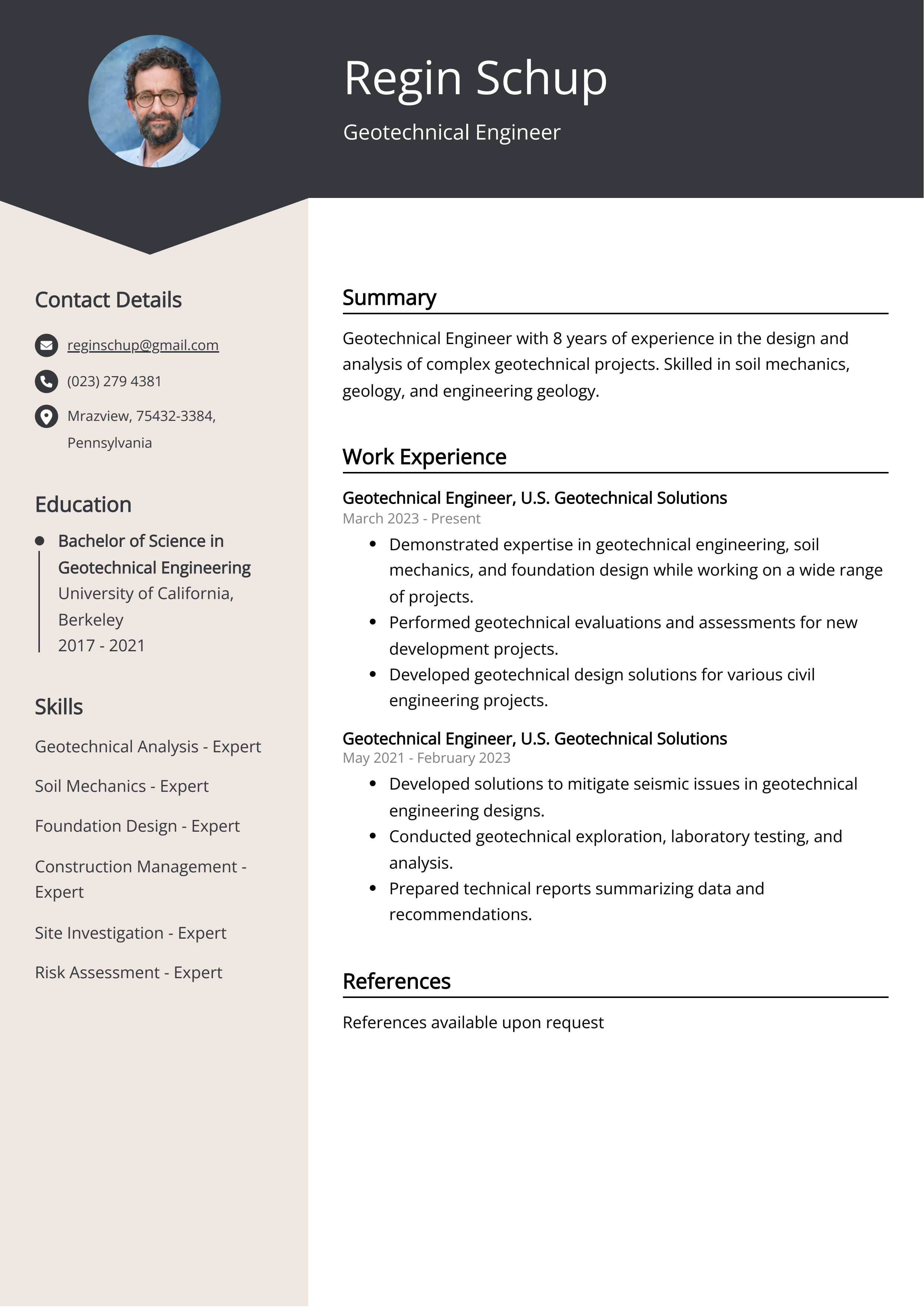Get This Report about Geotheta
Get This Report about Geotheta
Blog Article
The Definitive Guide for Geotheta
Table of ContentsGeotheta - QuestionsGetting The Geotheta To WorkThe 8-Minute Rule for GeothetaThe Geotheta IdeasOur Geotheta Diaries

They carry out website investigations, gather samples, do laboratory examinations, and examine information to examine the viability of the ground for construction projects - Consulting Engineers. Based upon their findings, geotechnical designers supply suggestions for foundation design, slope stability, maintaining frameworks, and reduction of geotechnical dangers. They team up with various other specialists, such as engineers, structural designers, and construction teams, to make certain that geotechnical considerations are integrated into the total job style and execution
By examining the habits and buildings of dirt and rock, they can identify possible geotechnical hazards such as landslides, soil negotiation, or slope instability. Their know-how assists avoid failures or accidents that can jeopardize lives and residential property. Below are some thorough obligations and obligations of a geotechnical engineer: Site Investigation: Geotechnical engineers conduct website examinations to collect data on subsurface problems.
They analyze the information to comprehend the residential properties and behavior of the soil and rock, including their toughness, leaks in the structure, compaction attributes, and groundwater problems. Geotechnical Analysis and Layout: Geotechnical designers analyze the information collected throughout website investigations to assess the stability and viability of the website for building jobs. They execute geotechnical computations and modeling to assess aspects such as bearing capability, settlement, slope stability, side earth stress, and groundwater flow.
The Definitive Guide for Geotheta
Foundation Layout: Geotechnical designers play an important function in creating foundations that can securely support the desired structure. They examine the soil conditions and lots demands to determine the ideal foundation type, such as shallow structures (e.g., footings), deep foundations (e.g (https://flossy-rotate-3d1.notion.site/Why-Geotechnical-Engineers-are-Vital-for-Your-Construction-Projects-7c147cf012a34d1abe5134afbabc811f?pvs=4)., stacks), or specialized methods like dirt renovation. They think about elements such as settlement restrictions, bearing capacity, and soil-structure communication to create optimum structure layouts
They examine building and construction strategies, display site tasks, and conduct field assessments to confirm that the design suggestions are followed. If unforeseen geotechnical concerns arise, they examine the circumstance and supply recommendations for removal or adjustments to the style. Threat Analysis and Mitigation: Geotechnical engineers evaluate geotechnical dangers and risks connected with the task website, such as landslides, liquefaction, or soil erosion.

Collaboration and Communication: Geotechnical designers function carefully with other professionals involved in a task, such as engineers, architectural engineers, and building and construction teams. Reliable communication and partnership are vital to incorporate geotechnical factors to consider right into the total project layout and building procedure. Geotechnical designers supply technological know-how, solution inquiries, and ensure that geotechnical requirements are fulfilled.
Geotheta Can Be Fun For Everyone
Below are some sorts of geotechnical engineers: Foundation Engineer: Foundation engineers specialize in creating and examining structures for frameworks. They evaluate the dirt conditions, load needs, and site features to identify the most appropriate foundation type and design, such as superficial foundations, deep foundations, or specialized techniques like heap foundations.
They review the variables affecting slope stability, such as soil residential or commercial properties, groundwater problems, and incline geometry, and establish approaches to avoid incline my website failures and alleviate threats. Quake Designer: Quake designers specialize in evaluating and making structures to withstand seismic pressures. They evaluate the seismic danger of a site, evaluate soil liquefaction possibility, and create seismic design criteria to ensure the safety and strength of structures throughout earthquakes.
They perform area screening, collect examples, and examine the collected information to identify the dirt homes, geologic formations, and groundwater conditions at a site. Geotechnical Instrumentation Engineer: Geotechnical instrumentation designers focus on surveillance and determining the actions of soil, rock, and structures. They install and keep instrumentation systems that check variables such as dirt negotiation, groundwater degrees, slope movements, and structural displacements to analyze performance and supply early warnings of potential concerns.
Geotheta Fundamentals Explained
They perform tests such as triaxial tests, consolidation examinations, straight shear examinations, and leaks in the structure examinations to gather data for geotechnical evaluation and design. Geosynthetics Engineer: Geosynthetics engineers concentrate on the style and application of geosynthetic products, such as geotextiles, geogrids, and geomembranes. They use these materials to enhance dirt stability, strengthen slopes, supply drainage options, and control disintegration.
They often tend to be investigatory individuals, which suggests they're intellectual, reflective, and analytical. They are interested, systematic, logical, logical, and sensible. Some of them are likewise social, indicating they're kind, charitable, cooperative, patient, caring, handy, understanding, sensible, and friendly - Consulting Engineer.
In the workplace environment, geotechnical engineers use specialized software devices to perform computations, create layouts, and evaluate information. They prepare reports, review project specifications, interact with clients and employee, and coordinate task activities. The office setting gives a conducive setting for research study, evaluation, and collaboration with various other professionals associated with the job.
Get This Report on Geotheta
They regularly check out job sites to perform website investigations, assess geotechnical conditions, and collect information for evaluation. These sees include traveling to different areas, occasionally in remote or challenging surfaces. Geotechnical engineers might carry out dirt tasting, conduct tests, and monitor building and construction tasks to make sure that the geotechnical aspects of the project are being executed properly.
Geotechnical designers likewise work in specialized geotechnical research laboratories. In these centers, they conduct experiments, do examinations on dirt and rock examples, and analyze the engineering homes of the materials. Geotechnical lab designers work extensively in these settings, taking care of screening equipment, running tools, and tape-recording information. They work together with other research laboratory personnel to ensure accurate and reliable testing results.
Report this page